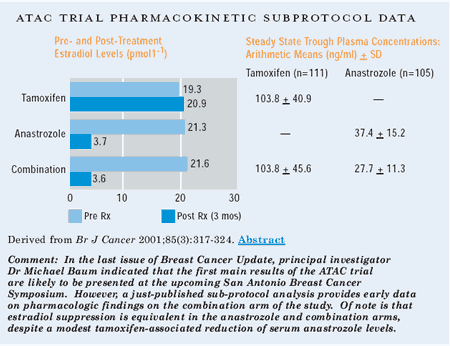| You
are here: Home: BCU 4|2001: Section 5

Section 5
Clinical Use of Aromatase Inhibitors
USE AS FIRST-LINE
ENDOCRINE THERAPY OF METASTATIC BREAST CANCER
I’m using
aromatase inhibitors first-line. The data for response rate and
time to progression are very compelling that these agents are as
good if not better than tamoxifen in ER-positive patients. They
also don’t have the thromboembolic risk, which is small but
substantial with tamoxifen,and they’re very user-friendly.
Plus, a lot of women are concerned about tamoxifen use — sometimes
inappropriately — and the aromatase inhibitors are much less
threatening. So, I’m using these agents in those patients.
We are all also
very excited about the ATAC adjuvant trial — anastrozole, tamoxifen
or the combination. The study has accrued more than 9,000 patients,
and to my knowledge, it’s the largest randomized trial in early
-stage breast cancer that’s ever been done. There hopefully
will be some preliminary data available this year. This is very
exciting — to look at anastrozole up front as adjuvant therapy
in postmenopausal patients.
—Hyman
Muss, MD
AROMATASE
INHIBITORS AS ADJUVANT THERAPY WHEN TAMOXIFEN IS CONTRADICTED
There are select
patients for whom SERMs — whether it’s tamoxifen or toremifene
— are contraindicated. Certainly, there are people for whom
there might be a compelling reason to use adjuvant endocrine therapy
— those with multiple nodes, a large tumor — but for whom
you’re still concerned about the side effects of tamoxifen
such as in patients with a history of DVT or those taking anticoagulants.
I think the
data are so good in postmenopausal patients with metastases that,short
of seeing the ATAC trial data, it’s reasonable to use an aromatase
inhibitor in these cases, And I have done it in several patients.
I think you should tell the patient that these drugs are not FDA-approved
as adjuvant therapy, but there hasn’t been one study that didn’t
fall in a positive direction of the aromatase inhibitor being better
than tamoxifen in metastastic disease.
—Hyman
Muss, MD
We rarely use
aromatase inhibitors in the adjuvant setting, but I do have a few
postmenopausal patients who have really struggled to tolerate tamoxifen
who clearly said, “I just can’t take this for five years.”
Then I think it’s very reasonable to switch them to an aromatase
inhibitor instead of being on no hormonal therapy, which would be
the alternative in that situation.
I’ve also
had a couple of patients who had significant coronary artery disease,
previous thrombotic stroke and are on chronic anticoagulation because
of those problems. And then I think it would also be reason-able
to think about an aromatase inhibitor. Other than those situations,
we’ve not used adjuvant aromatase inhibitors except in a trial
setting.
—Kathy
M i l l e r, MD

Page
1 of 2
Next
|
